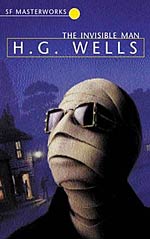
![]() Sable Aradia
Sable Aradia
10/16/2019
![]()
Read for the Science Fiction Masterworks Book Club.
You really can't go wrong with H.G. Wells, can you? Even if you know the story. Even if you've read it before.
Granted, it's been many years since I read it last. I was still a child, I think. I also remember doing it as a radio play assignment as a kid in grade school (which led to a whole subgenre of play where my friends and I would make our own radio plays, or make tapes of us acting like radio DJs, or whatever.)
You all know the premise. A man somehow makes himself invisible through a combination of chemistry and 19th century pseudo-science. He finds out it isn't all it's cracked up to be. For instance, to remain invisible, you have to be naked, and winter is bloody cold in England. Plus bare feet step on things.
What isn't often emphasized by people who talk about this story is that Wells is, in fact, a consummate storyteller. In the late 19th century, the novel was still a relatively new art form. Reading some of the early novelists is a bit... challenging at times. H.P. Lovecraft could write a single sentence that was three pages long. Virginia Woolf and Mary Shelley could write the most amazingly purple prose. I often think our modern novel is too codified (they literally have graphs that they teach in writing classes to show writers how the perfect novel should proceed) but in the early days, novelists were still forging the path, and figuring out how the art was done.
And yet, Wells' work still stands up as "good writing," now that we know what "good writing" looks like (or think we do.) The story draws you in right away, perhaps because he begins in the middle. When we catch up with the Invisible Man, he has already made himself invisible, and he has already gotten himself into some trouble and is hoping to get himself out. Only later do we get the back story of how this was accomplished.
Another thing that's amazing about the quality of the writing here is the moral ambiguity of all characters. The Invisible Man is a classic sociopath, completely devoid of normal human empathy, and he was like this before he made himself invisible. Just... consider the damage that could be done by an invisible sociopath!
On the other hand, the fear, superstition, and suspicion of the townsfolk lead them to treat our protagonist horribly, and long before they have any reason to do so. It makes you sympathetic towards someone who would otherwise be a completely unlikable person. Dark fantasy authors: take note. If you want me to like your sociopath, you need to find a way to make me appreciate their pain too.
A must-read for any fan of science fiction; or indeed, for anyone.
http://www.dianemorrisonfiction.com